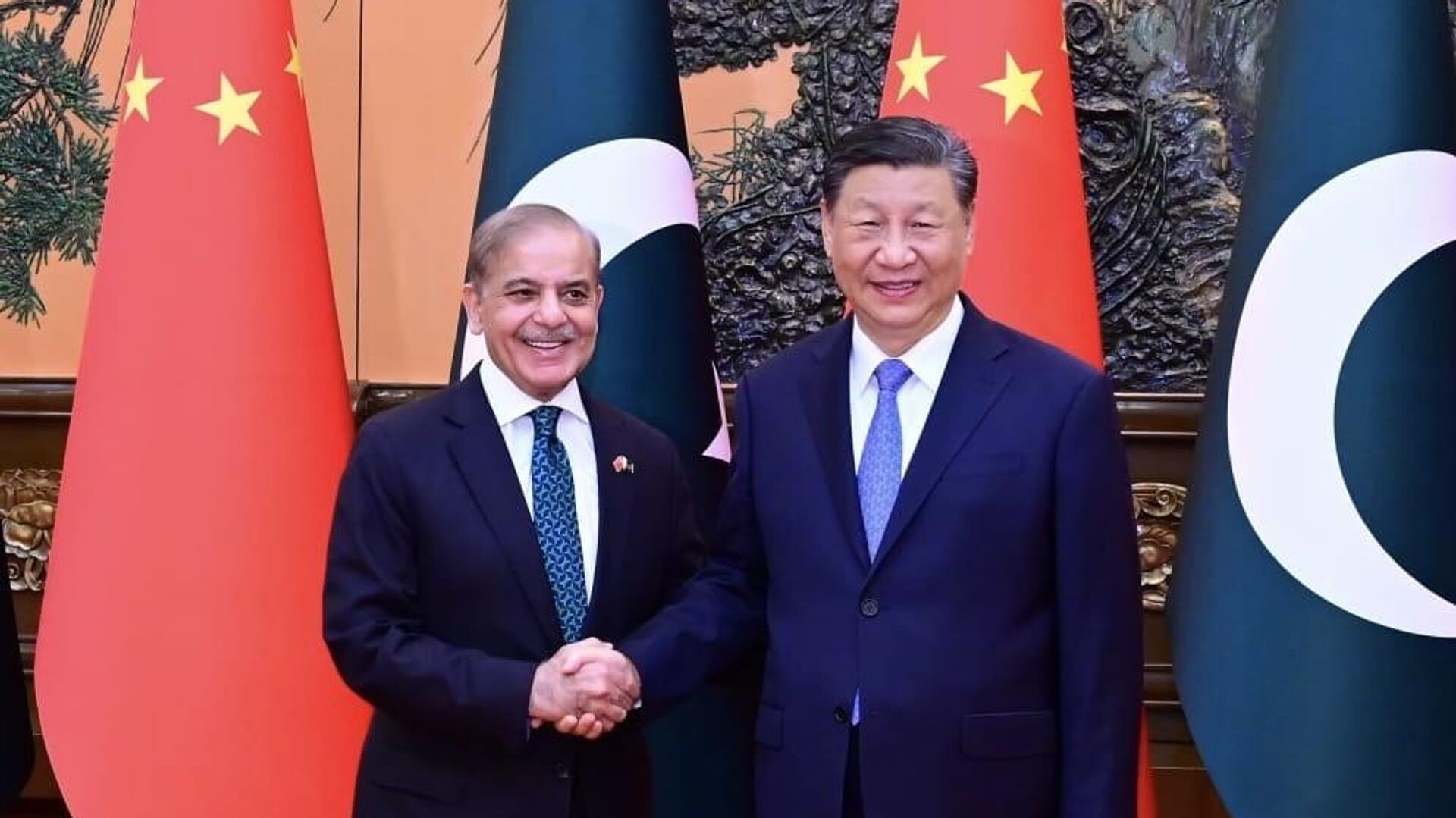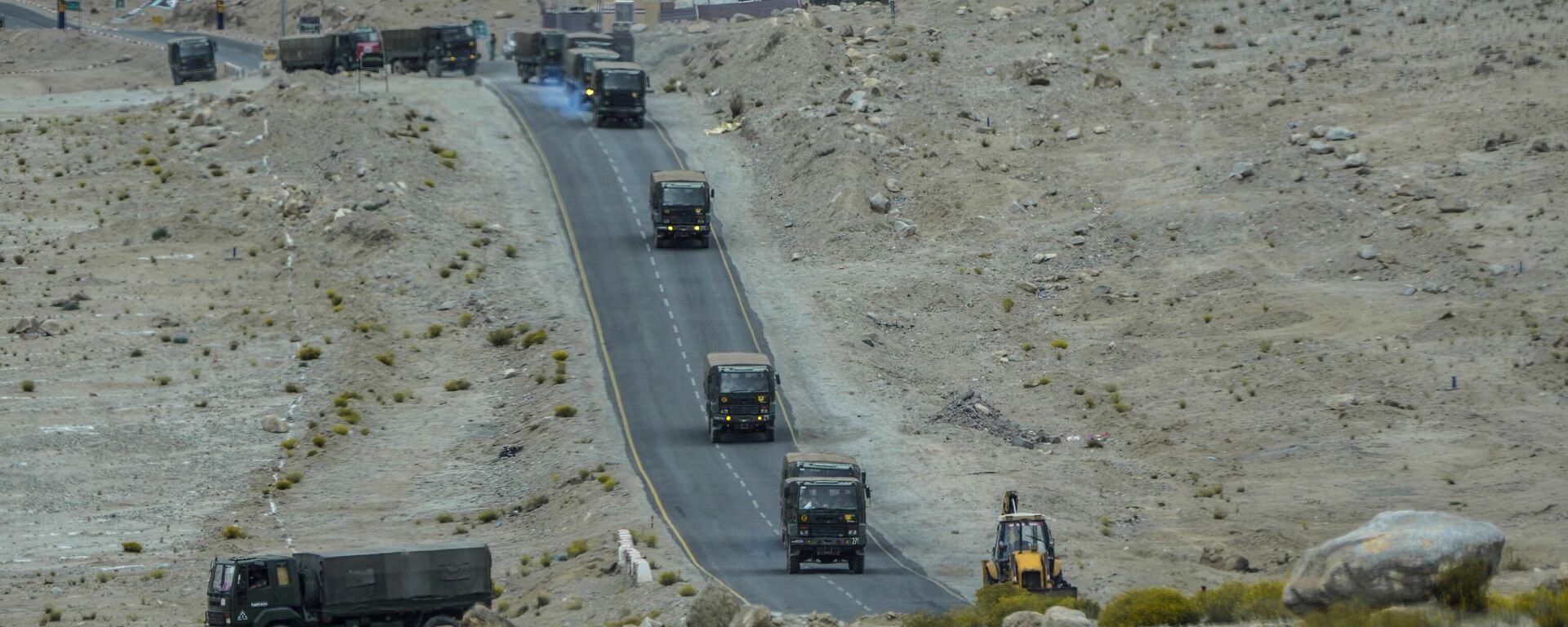https://sputniknews.in/20240625/pakistan--china-renew-commitment-to-next-phase-of-cpec-despite-challenges-7702198.html
Pakistan & China Renew Commitment to Next Phase of CPEC Despite Challenges
Pakistan & China Renew Commitment to Next Phase of CPEC Despite Challenges
Sputnik India
Chinese support for the next phase of the corridor project is crucial for Pakistan’s industrial development amid the ongoing global power shift.
2024-06-25T20:52+0530
2024-06-25T20:52+0530
2024-06-25T21:23+0530
shehbaz sharif
xi jinping
china-pakistan economic corridor (cpec)
pakistan
china
nato
balochistan
gwadar port
national security
investment
https://cdn1.img.sputniknews.in/img/07e8/06/09/7573939_0:269:994:828_1920x0_80_0_0_85cf42e70011ba7b64150694c3d37f96.jpg
A Chinese delegation of high-ranking officials was recently in Islamabad to meet with Pakistan's political and military leaders.During the meetings the two countries reaffirmed their commitment to the $60 billion China-Pakistan Economic Corridor (CPEC).Co-chaired by Pakistani Deputy Prime Minister Ishaq Dar and Chinese Minister of the Chinese Communist Party Liu Jianchao, Friday’s event saw agreements on bolstering bilateral relations and focusing on developing the CPEC's second phase.Although the agreements aim to benefit the two countries, they are not without challenges.Clarity in Pakistan’s Foreign PolicySputnik India spoke with Fahad Masood, a retired squadron leader of the Pakistani Air Force (PAF) and an international security analyst. He said that for CPEC to reach its full potential, Pakistan needs clarity in its foreign policy.The analyst said that Pakistan's leaders are currently trying to remain neutral in their foreign policy, despite a global power shift taking place.While there were initial successes with construction of power plants, roads and setting up of economic zones around the port of Gwadar, the CPEC has had a bumpy ride in Pakistan since 2015 due to the country’s political and economic crisis.Another major hurdle to the mega-project is the security threat posed by attacks on Chinese workers and infrastructure in Pakistan by militant groups operating in the Balochistan and KPK provinces.Gem of the CPECScottish-based writer and political analyst Parvez Salik told Sputnik India that Gwadar has not yet reached its maximum potential, and the economic zones around the port also need a serious boost."Pakistan would benefit from increases in trade, infrastructure and industry, however, the port which was termed as the 'Gem of the CPEC' was completed in 2007 and handed over to China in 2013," he added. "Many thought that the small fishing village of Gwadar would become the next Dubai, but so far it has not reached its full potential."Gwadar is operating at a limited capacity for many reasons. The port is situated in a remote region of Balochistan, which is among the poorest regions of Pakistan and has large militant groups that routinely carry out attacks on troops and civilians.He said Pakistan must reaffirm its commitment to protecting Chinese foreign investments and upholding the rule of law to protect Chinese nationals working on CPEC projects across Pakistan, so that CPEC-II reaches its full potential in the near future.CPEC-II includes investments in the energy sector, which will help overcome Pakistan's chronic power shortages and ensure a stable supply of electricity.The second phase also aims to develop economic zones around the port that provides a shortcut for China's access to the Persian Gulf to conduct trade and secure oil deals.Earlier this month, Pakistani Prime Minister Shehbaz Sharif paid a visit to Beijing and met with Chinese President Xi Jinping and other top leaders.The two countries agreed to forge an ‘upgraded version’ of CPEC by jointly building a growth corridor, a livelihood-enhancing corridor, an innovation corridor, a green corridor and an open corridor, aligning with Pakistan’s 5Es Framework based on Exports, E-Pakistan, Environment, Energy and Equity and Empowerment.
https://sputniknews.in/20240327/terrorist-attacks-on-chinese-nationals-in-pakistan-raise-concerns-for-cpec-security-6962578.html
china-pakistan economic corridor (cpec)
pakistan
china
balochistan
gwadar port
Sputnik India
feedback.hindi@sputniknews.com
+74956456601
MIA „Rossiya Segodnya“
2024
Aneela Rashid
https://cdn1.img.sputniknews.in/img/07e6/0c/0d/74548_0:0:485:484_100x100_80_0_0_821526e967ae85d041e2d30ee34fa1de.jpg
Aneela Rashid
https://cdn1.img.sputniknews.in/img/07e6/0c/0d/74548_0:0:485:484_100x100_80_0_0_821526e967ae85d041e2d30ee34fa1de.jpg
News
en_IN
Sputnik India
feedback.hindi@sputniknews.com
+74956456601
MIA „Rossiya Segodnya“
Sputnik India
feedback.hindi@sputniknews.com
+74956456601
MIA „Rossiya Segodnya“
Aneela Rashid
https://cdn1.img.sputniknews.in/img/07e6/0c/0d/74548_0:0:485:484_100x100_80_0_0_821526e967ae85d041e2d30ee34fa1de.jpg
cpec, pakistan-china, pak, china, gwadar, china-pakistan economic corridor
cpec, pakistan-china, pak, china, gwadar, china-pakistan economic corridor
Pakistan & China Renew Commitment to Next Phase of CPEC Despite Challenges
20:52 25.06.2024 (Updated: 21:23 25.06.2024) Chinese support for the next phase of the corridor project is crucial for Pakistan’s industrial development amid the ongoing global power shift.
A Chinese delegation of high-ranking officials was recently in Islamabad to meet with Pakistan's political and military leaders.
During the meetings the two countries reaffirmed their commitment to the $60 billion China-Pakistan Economic Corridor (CPEC).
Co-chaired by Pakistani Deputy Prime Minister Ishaq Dar and Chinese Minister of the Chinese Communist Party Liu Jianchao, Friday’s event saw agreements on bolstering bilateral relations and focusing on developing the CPEC's second phase.
Although the agreements aim to benefit the two countries, they are not without challenges.
Clarity in Pakistan’s Foreign Policy
Sputnik India spoke with
Fahad Masood, a retired squadron leader of the Pakistani Air Force (PAF) and an international security analyst. He said that for CPEC to reach its full potential,
Pakistan needs clarity in its foreign policy.
"Pakistan's strategic direction at present lacks some clarity because with the rise of the Chinese economy and diminishing western economy, the pure capitalists are forcing countries to rethink their friends." Masood said. "In international politics there are no permanent friends, nor permanent enemies, the only thing that is permanent or constant is the national interest."
The analyst said that Pakistan's leaders are currently trying to remain neutral in their foreign policy, despite a global power shift taking place.
"China has invested millions of dollars into Pakistan, but because Islamabad is not completely aligning with what China is providing to Pakistan, CPEC is in a state of limbo," Masood said. "Beijing has the competence and money to flex its giant economic and military muscle, and Pakistan needs to decide whether it wants to be a part of that, because until there is clarity and correct strategic direction there will remain certain hurdles in the way."
While there were initial successes with construction of power plants, roads and setting up of economic zones around the port of Gwadar, the CPEC has had a bumpy ride in Pakistan since 2015 due to the country’s political and economic crisis.
Another major hurdle to the mega-project is the
security threat posed by attacks on Chinese workers and infrastructure in Pakistan by militant groups operating in the Balochistan and KPK provinces.
Scottish-based writer and political analyst Parvez Salik told Sputnik India that Gwadar has not yet reached its maximum potential, and the economic zones around the port also need a serious boost.
"The idea behind Gwadar port was to connect China's western Xinjiang province with the Arabian Sea through Pakistan," Salik said. "This would shorten trade routes for China by thousands of miles and open access to the Gulf and beyond."
"
Pakistan would benefit from increases in trade, infrastructure and industry, however, the port which was termed as the 'Gem of the CPEC' was completed in 2007 and handed over to China in 2013," he added. "Many thought that the small fishing village of Gwadar would become the next Dubai, but so far it has not reached its full potential."
Gwadar is operating at a limited capacity for many reasons. The port is situated in a remote region of Balochistan, which is among the poorest regions of Pakistan and has large militant groups that routinely carry out attacks on troops and civilians.
"Lack of investment into Gwadar is another reason for its limited functionality. In recent years Pakistan faced an economic crisis which affected the pace of its development significantly," Salik said. "Nevertheless, China has been a solid friend and a good neighbor to Pakistan for decades and in many ways a lot has been achieved that has been beneficial to both the countries."
He said Pakistan must reaffirm its commitment to protecting Chinese foreign investments and upholding the rule of law to protect Chinese nationals working on CPEC projects across Pakistan, so that CPEC-II reaches its full potential in the near future.
CPEC-II includes investments in the energy sector, which will help overcome Pakistan's chronic power shortages and ensure a stable supply of electricity.
The second phase also aims to develop economic zones around the port that provides a shortcut for China's access to the Persian Gulf to conduct trade and secure oil deals.
Earlier this month, Pakistani Prime Minister Shehbaz Sharif paid a visit to Beijing and met with Chinese President Xi Jinping and other top leaders.
The two countries agreed to forge an ‘upgraded version’ of CPEC by jointly building a growth corridor, a livelihood-enhancing corridor, an innovation corridor, a green corridor and an open corridor, aligning with Pakistan’s 5Es Framework based on Exports, E-Pakistan, Environment, Energy and Equity and Empowerment.



